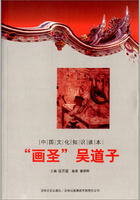But the majority of them sneered at the champion,and many refused point—blankc to consider any proposition to discard the advertisements.Indeed,some were proud of them,and believed it a mark of distinction to have their fences and sheds announce an eye—remedy or several varieties of pickles.
M r.Wa t s o n ,a t f i r s t a n a m u s e d o b s e r v e r o f t h e campaign,soon became indignant at the way that Kenneth was ridiculeda and reviledb;and he took a hand in the ?ght himself.He decided to call a meeting of the neighboring farmers at the district school—house on Saturday night,where Kenneth could address them with logical arguments and endeavor to win them over to his way of thinking.
The invitation was promptly accepted by the rural population;not so much because they were interested in the novel ideas of the young artist as because they expected to be amused by hearing the boyish master of Elmhurst "lecture at 'em."So they ?lled the little room to over?owing,and to add to the dignity of the proceedings the Hon.Erastus Hopkins,State Representative for the district,lent his presence to theassemblagec.
Not that the Honorable Erastus cared a fig about this foolish talk of exterminating advertising signs.He was himself a large stockholder in a breakfast—food factory,which painted signs wherever it could secure space.These signs were not works of art,but they were distinctly helpful to business,and only a fool,in the opinion of the Honorable Erastus,would protest against the inevitable.
What brought the legislator to the meeting was the fact that he was coming forward for re—election in November,andbelieved that this afforded a good chance to meet some of his constituents and make a favorable impression.So he came early and shook hands with everyone that arrived,and afterward took as prominent a seat as possible.
Indeed,the gathering had at ?rst the appearance of beinga political one,so entirely did the Representative dominate it.But Mr.Watson took the platform and shyly introduced the speaker of the evening.
The farmers all knew Mr.Watson,and liked him;sowhen Kenneth rose they prepared to listen in respectful silence.
Usually a young man making his maidena speech is somewhat diffidentb;but young Forbes was so thoroughly in earnest and so indignant at the opposition that his plans had encountered that he forgot that it was his ?rst public speech and thought only of impressing his hearers with his views,exulting inc the fact that on this occasion they could not "talk back,"as they usually did in private when he tried to argue with them.So he exhortedd them earnestly to keep their homes beautiful and free from the degradation of advertising,and never to permit glaring commercialism to mar the scenery around them.He told them what he had been able to accomplish by himself,in a short time;how he had redeemede the glen from its disgraceful condition and restored it to its former beauty.Heasked them to observe Webb's pretty homesteada,no longer marred by the unsightlyb sign upon the barn.And then he appealed to them to help him in driving all the advertising signs out of the community.
When he ended they applauded his speech mildly;but itwas chie?y for the reason that he had spoken so forciblyc and well.
Then the Honorable Erastus Hopkins,quick to catch thelack of sympathy in the audience,stood up and begged leave tod reply to young Forbes.
He said the objection to advertising signs was only a rich man's aristocratic hobby,and that it could not be indulged in a democratic community of honest people.His own ?rm,he said,bought thousands of bushels of oats from the farmers and converted them into the celebrated Eagle—Eye Breakfast Food,three packages for a quarter.They sold this breakfast food to thousands of farmers,to give them health and strength to harvest another crop of oats.Thus he "bene?ted the community going and coming."What!Should he not advertise this mutual—benefit commodity wherever he pleased,and especially among the farmers?What aristocratic notion could prevent him?It was a mighty good thing for the farmers to be reminded,by means of the signs on their barns and fences,ofthe things they needed in daily life.
If the young man at Elmhurst would like to be of public service he might find some better way to do so than by advancing such crazy ideas.But this,continued the Representative,was a subject of small importance.What he wished especially to call their attention to was the fact that he had served the district faithfully as Representative,and deserved their suffragesa for renominationb.And then he began to discuss political questions in general and his own merits in particular,so that Kenneth and Mr.Watson,disgusted at the way in which the Honorable Erastus had captured the meeting,left the school—house and indignantly returned to Elmhurst.
"This man Hopkins,"said Mr.Watson,angrily,"is not agentleman.He's an impertinentc meddlerd.""He ruined any good effect my speech might have created,"said Kenneth,gloomily.
"Give it up,my boy,"advised the elder man,laying a kindly hand on the youth's shoulder."It really isn't worth the struggle.""But I can't give it up and acknowledge myself beaten,"protested Kenneth,almost ready to weep with disappointment."Well,well,let's think it over,Ken,and see whatcan be done.Perhaps that rascally Hopkins was right when he advised you to ?nd some other way to serve the community.""I can't do better than to make it clean—to do away withthese disreputable signs,"said the boy,stubbornly.
"You made a ?ne speech,"declared Mr.Watson,gravely puf?ng his pipe."I am very proud of you,my lad."Kenneth ?ushed red.He was by nature shy and retiring to a degree.Only his pent—upa enthusiasm had carried him through the ordealb,and now that it was over he was chagrinedc to think that the speech had been so ineffective.He was modest enough to believe that another speaker might have done better.















